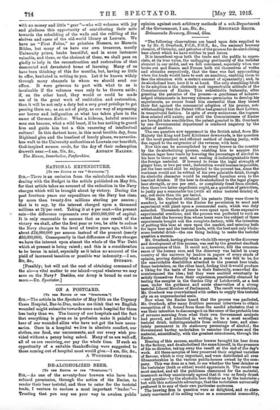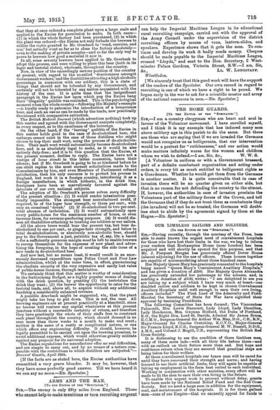DE-ALCOHOLIZED BEER.
f To ena Intros or rea nerseratoa"1
SIR,—As one of the seventy-four brewers who have been refused permission, through the action of the Excise, to render their beer teetotal, and thus to cater for the teetotal trade, I venture to enclose a most important " leaden"— Trusting that you may see your way to awaken public
opinion against such arbitrary methods of a sub-Department
of the Government, I am, Sir, ,te., REGINA.LD SMITH. Brintscombe Brewery, Stroud, Gke.
" The following observations are based upon data supplied to no by Mr. 0. Overbeck, P.C.S., P.G.S., ese., the eminent brewery chemist, of Grimsby, and patentee of the process for de-alcoholising beer about which we have written in past issues. It is incumbent upon both the trade and the public to appre- ciate, at its true value, the unflagging pertinacity of the teetotal element in our midst, and we felt convinced, especially when war broke out and Russia and France both rid themselves of vodka and absinthe respectively, that the time was fast approaching when the trade would have to seek an auxiliary, enabling them to face the situation with a certain amount of equanimity ; and, in de-alcoholised beer, here it is at hand. The only stumbling-block to its adoption is the obstinate and impenetrable attitude of the Commissioners of Excise. This redoubtable fraternity, after granting the patentee of the process—a gentleman at aelmow- ledged attainments in brewery science—permission to develop his experiments, no sooner found him successful than they issued their fiat against the commercial adoption of his process, not- withstanding that the Patent Office had granted him their Letters, in unequivocal fashion. In spite of every endeavour, the impasse thus created still exists ; and until the Commissioners of Excise are brought into sensible line, the patent granted to Mr. Overbeck by one Governmental department is rendered nugatory by the antics of another.
The one question now uppermost in the British mind, from His Majesty the King and Lord Kitchener downwards, is the question of the most practical and efficient method of dealing justly, with due regard to the exigencies of the revenue, with beer.
Now this can be accomplished by every brewer in the country by the dealcoholising process, enabling him to acquire. the Gorman lager beer trade by lowering the percentage of alcohol in his beer to three per cont. and making it indistinguishable from the foreign material. If lowered to twice the legal strength of ginger beer, or two per cent., inebriation would become impossible, yet the boor could still be subjected to the present tar, smce the workman would not be robbed of his own palatable drink, though its alcoholic character would be rendered harmless even to the heaviest drinker. If the beer is de-alcoholised to the legal ginger beer strength, or one per cent., or completely freed from alcohol, then these two latter expediente ought, se a question of patriotism, to justly pay a reasonable tax (with all other teetotal drinks) of, say, not more than 10s. per barreL When Mr. Overbeck obtained his patents (they were three in number), he applied to the Excise for permission to erect and experiment with plant upon a commercial scale, which was duly accorded. Thousands of pounds were spent upon those expensive experimental erections, and tho process was perfected to such an extent that the brewery firm whose beers were the subject of these experiments bought out the complete factory, with the intention of putting this beer at once upon the market, and catering both for lager beer and the teetotal trade, with the bestand only whole- some teetotal drink—the one thing lacking to make the teetotal question a =COMIC Mr. Overbeck, having given his whole life energy to the discovery and development of this process, was met by the greatest deadlock in consequence of this.. It could not, however, kill the common- sense of the human race, and the discovery was bailed in every country of the universe by leaders in papers of every shade of opinion, proving distinctly what a panacea it was felt to be, for the unavoidable disabilities attached to the present beer trade. Some teetotalers, on the other band, feeling that it would produce a liking for the teats of beer in their fraternity, somewhat die- countenamed the idea ; but they were enabled eventually to satiety themselves from their experience, practically obtained by testing the samples in the Garden City of Letchworth, as a test ease, under the guidance and acute observation of a strong teetotal Liberal Member of Parliament. The result was electrical. Mr. Overbeck was overwhelmed with orders to supply this teetotal city on an unprecedented scale. Now when the Excise heard that the process was perfected, Mr. Overbeck, after many fruitless personal interviews to obtain recognition of it, forced from them the candid admission that it was their intention to discourage it on the score of the probable toes of revenue accruing from what their own Government analysts had proved, and admitted in writing, to be a most excellent teetotal drink, indistinguishable from ordinary beer, and abso- lutely permanent in its stationary percentage of alcohol; the Government having undertaken to examine the process and the material, scientifically, with the greatest minuteness, through the Excise.
Hearing of this success, another brewer brought his beer down to the factory, and dealooholised the same himself, in the presence of his eo-director, taking away the result at the end of the day's. work. All these samples of beer preserved their original varieties of flavour, which is very important, and were distributed all over Gloucestershire in the various public-houses owned by the com- pany. This was done as a test, to see whether the beer drinker or the teetotaler (both or either) would appreciate it. The result was most marked, and all the publicans clamoured for the material, inasmuch as they unanimously agreed that it was as freely drunk —and popular--by the alcoholic beer drinker as by the teetotaler but with this noticeable advantage, that the teetotalers universally preferred it to any of their own particular nostrums. The brewing firm in question were as delighted, and so &boor lately convinced of its selling value as a commercial commodity, that they at once ordered a complete plant upon a large scale and applied to the Excise for permission to make. In both cases—
(I) in which the whole factory had been purchased. (2) in which the plant was ordered—the Excise not only forbade the brewers to utilize the rights granted to Mr. Overbook to `vend, exercise, and use,' but actually went no far as to close the factory absolutely— even to the making of private samples—and so far the only way to prove to brewers how good a material it now is In all, some seventy brewers have applied to Mr. Overbeck to adopt this process, end were willing to place this beer (both in its lager and teetotal states), wholesale, throughout the country.
Now, in view of the exceedingly serious position of the country at present, with regard to the so-called • drunkenness amongst Government workers,' and the disabilities attending a high alcoholic percentage in connexion with our soldiery, this is a state of things that should not be tolerated by any Government, and certainly will not be tolerated by any nation acquainted with the history of the case. It is quite time that the insignificant paragraph in the Excise law upon which peg the Excise bang their 'illegality' quibble was rescinded. This is the psychological moment when the whole country—following His Majesty's example —is loyally ready to patronize the introduction of a temperance beer, and such an one as can be made by the trade, now practically threatened with comparative extinction. The British Medical Journal (which advertises nothing) took up this matter and agreed with the Government analysts completely, in every respect, as to the excellence of the beverage.
On the other hand, if the • barring' quibble of the Excise in this matter holds good in the case of de-aleoholized beer, the embargo cannot exist in the case of those distillers who might choose to hop their malt wort, using the process of de-alcoholiza- tion. Their malt wort would automatically become de-alcoholized beer, and is as absolutely legal to make, as it would be also entirely duty-free; and it is to this question that the Excise, at the present moment, decline to reply. The Excise have not a vestige of locus standi in this latter connexion, hence their silence; but if Mr. Overbook is going to be so hindered before he can elicit replies, to the most earnest solicitations made to the Commissioners by him, and even Members of Parliament refused satisfaction, then his only resource is to protect his process in England, but work it in a foreign country, introducing it as a foreign manufacture, in which hitherto, in the drink line, foreigners have been so marvelloualy favoured against the interests of our own national subjects. The adoption of Mr. Overbeck's process solves every difficulty of the present situation (1) It would render intoxication prac- tically impossible. The strongest beer manufactured could, if required, be of the lager beer strength, or three per cent., with only an occasional ' drunk.' (2) If de-alcoholized to two per cent. total absence of inebriation. (3) It would automatically open every public-house for the maximum number of hours, or even increase them, for revenue-producing purposes. (4) It would dis- arm all disabilities attaching to treating our soldiers or our sailors. All the above beers would bear the present tax, but beer de- alcoholized to one per cent., or ginger-beer strength, and below to total de-alcoholization, or absolutely non-alcoholio beer, should pay to the Government a just, patriotic tax of, say, 105. a barrel —for a sufficiently generous margin must be loft to enable brewers to recoup themselves for the expenses of new plant and adver- tising the foregoing, in the hope of creating the side issue of a new trade in de-alcoholized beer.
And now last, but no means least, it would result in an enor- mously decreased expenditure upon Police Court and Poor Law administration, whilst at the same time, in effect, guaranteeing the absolute security of the very expensive and easily lost value of public-house licences, through inebriation.
We certainly think that this matter is worthy of consideration in the forthcoming Budget, as a highly popular means of dealing with the drink question, by granting (1) the teetotalers the drink they want ; (2) the brewer the opportunity to cater for the teetotal trade, and, above all, to acquire without any additional hardship a considerably enhanced revenue.
A possible drawback might be suggested, viz., that the plant might take too long to put down. This is not the case. All brewing engineers are at present practically at a Standstill, since no brewer will venture any capital whatsoever at this present juncture without a reasonable certainty of return, and therefore they have practically the whole of their staffs free to construct such plant throughout the country, which should demand in no case more than three weeks to a month to make and erect ; neither is the same of a costly or complicated nature, or one which offers any engineering difficulty. It should, however, be legally permitted to be carried out upon the brewing premises, to avoid additional expense, which would otherwise greatly militate against any proposal for its universal adoption.
The Excise regulations for manufacture offer no real difficulties, and are simple to carry out, and by no means of a nature com- parable with the restrictions to which distillers are subjected."— Brewers' Gazette, April 29th.
[If the facts are as stated here, the Excise authorities have committed a very grave blunder. It may be, however, that they have some perfectly good answer. Till we have heard it we can say no more.—En. Spectator.]



































 Previous page
Previous page